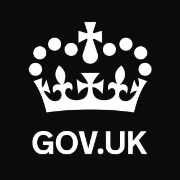Cowper’s Cut 304: If at first you don’t succeed, lie; lie again

Junior Doctors continue their strike today.
— Victoria Atkins (@VictoriaAtkins) January 3, 2024
That means more disruption for patients and staff.
My message remains the same. Call off the strikes and come back to the table.
Let’s start 2024 right.
The current round of junior doctors’ strikes (the longest-ever, and the first in 2024, but probably not the last) got under way amid a predictable row about derogations: the request for striking staff to return to work due to major and impossible-to-mitigate patient safety risks.
The British Medical Association’s response was to suggest that the agreed derogation process was being “undermined”: the medics’ trades union further claimed that several of those 20 hospitals had not illustrated the measures they had taken to mitigate the need for junior doctors to work during the planned industrial action.
The paper reported that “all but one of the requests were rejected, and the final one was being considered by the union”. The BMA promptly published its letter to NHS England chief executive Amanda Pritchard.
We have written to @AmandaPritchard to raise serious concerns about the way that @NHSEngland are engaging with the national derogations system and we are seeking her urgent intervention. Read the letter: https://t.co/UmCYlY2OEq pic.twitter.com/2pIzUOvcAf
— The BMA (@TheBMA) January 3, 2024
The BMA’s letter did not, however, evidence these claims with local detail.
All quiet on the Weston front
To understand the derogations row in context, we have to remember Weston General Hospital’s actions in April 2023.

News reports confirm that seven junior doctors who got union assent to leave the picket line at the request of Weston General Hospital found that the hospital already had sufficient cover.
The Bristol-cum-Somerset trust told BBC News that its derogation request had been responding to unplanned absences, but other staff had stepped in to provide cover, meaning ultimately it did not need the seven junior doctors.
Weston General has offered no decisive proof that its April 23 derogation request was justified.

Its statement to BBC News was an assertion, rather than proof. A well-run organisation would be able to produce staff rosters that would have proved or disproved the question.
NHS England wrote back to the BMA, with the interesting bait-and-switch claim that it is ”regrettable that the BMA calls into question the integrity and motive of local clinical leaders – some of whom are likely to be BMA members – who are requesting patient safety mitigations on behalf of their services, the staff who are working within them, and the patients who need them”.
However, the BMA’s letter does not make these claims about integrity or motive.
It describes what it sees as “politicisation and weaponisation” of the strikes, due to non-provision of information to back up derogation requests: “NHS England and some Trusts have refused to evidence any efforts to source alternative staffing or demonstrate rearrangements or cancellation of less urgent work.
“This refusal to provide the information necessary to take well informed decisions is fundamentally undermining the derogation process as we are being asked to take decisions about our members’ right to strike without the requisite information. NHS England, it feels, is wilfully placing the BMA in an impossible
situation”.
NHSE’s letter makes the fair point that “the higher volume of (derogation) applications … during this action is therefore a function of the time of year in which it has been called and the length of the action, as well as the fact that the impact of industrial action on NHS services and patients has continued to grow with each action”.
Datix, but for political leaders
The NHSE reply letter contains three proposed changes to the system: “for any future mitigation requests that local leaders deem necessary to submit, we will provide a timeframe within which they require a decision to avoid the risk inevitably transpiring (e.g. cancelled urgent surgery).
“ … we will from this point onwards be following up with Trusts who have had mitigations rejected by the BMA, or where they have not been considered in a timely fashion, to compile a picture of the impact this has had on services.
“We will reinforce the extant requirement for providers to record any patient safety incidents, and to specifically report those which occur during periods of industrial action to regional teams, so that we can evidence harm and near misses which might have been avoided”.
These aren’t unreasonable. It would likewise be sensible for the BMA to record and publish its derogation requests; the supporting evidence offered; and the reasons for refusal (if this is done).
It is like Datix, but for political leaders.
Poll tacks
New polling for YouGov shared exclusively with The Times found that 45% of respondents supported the junior doctors’ current, longest-ever, six-day strike, while 42% of respondents opposed it.
40% of those surveyed replied that the junior doctors’ pay demands were reasonable, with 36% deeming them to be unreasonable.
Asked whether the junior doctors were being reasonable or unreasonable as to the degree of the current strike action (presumably this means the exceptional duration and the timing at a peak of post-Christmas demand, although this is not clear), 38% of those sampled answered that they thought it reasonable, while 41% deemed the degree of action unreasonable.
After a year of increasing industrial action, this data shows that a small majority of the sampled public supporting the junior doctors in striking (by 3%) and in their pay demands (by 4%). Of those surveyed, a small majority (by 3%) considered the degree of this industrial action - the longest strike ever - unreasonable.
This indicates a fall in levels of public support for doctors’ strikes from previous polls’ data.
The Times write-up also cites separate research by Creation Healthcare which “suggested support among health workers themselves had increased, however, compared with previous rounds of strike action. Analysis of online conversations of UK healthcare professionals found only 2 per cent of those sharing their thoughts online disapproved of the action”.
Why the public hasn’t turned on striking doctors
It’s an interesting index of public confidence and trust that this (light-hearted) end-of-year Ipsos ‘naughty or nice’ poll found NHS staff came top - again - after a year of medical industrial action.
This data point sits on top of the 2023 Ipsos Veracity Index finding doctors and nurses are in the top few of the most trusted professions, as they have consistently been for many, many years.
The public have been living with noticeably deteriorating NHS performance, particularly in winter, since 2012-13. That is a decade of worsening access across the board. In this context, the fact that public opinion of the medical industrial action hasn’t been or turned heavily negative is a classic case of Things That Are Not Surprising.

The public have spotted that the Conservative And Unionist Party government has no plan for fixing the NHS access and performance problems, which long predate the pandemic.
The frothing of the Conservative And Unionist Party and their media stenographers, coupled with alternating chin-stroking and hand-wringing by NHS management representative organisations and by the Department For Health But Social Care’s wholly-owned subsidiary NHS England, has clearly failed to resonate with the general public.

Hello to Cut’s friends in the Conservative And Unionist Party, their media camp followers and NHS-adjacent bodies! What is your big message about the strikes?
‘There are access and safety problems with the NHS’?
You don’t say! Were you actually awake in the 2022-23 winter?
‘Oh no! These strikes will damage our usually-fantastic access to NHS safe, high-quality care!’
‘It’s going to be so great when the current strikes are over, and our access to prompt, safe NHS care snaps right back to its previous polished perfection.’
Give us a break. The political judgment on display here, from the Government and its adjacent organisations and from their useful idiots in the media, is astronomically bad.
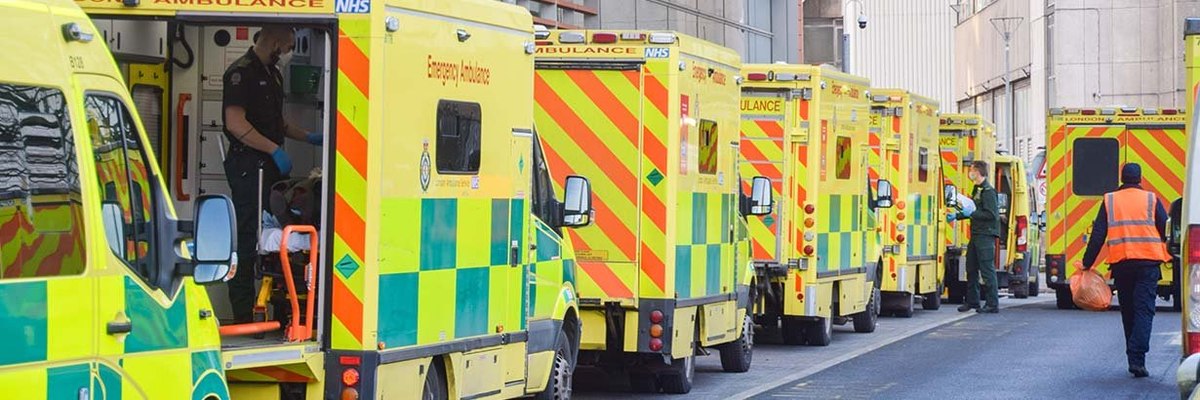
In other recent YouGov NHS polling, only 12% of those surveyed now say that the NHS is being handled well, with those saying ‘badly’ at 82% (it is seen as the Government’s second-worst handled issue, behind only immigration).
This research finds that “most people feel that the state of NHS services nationally are now bad (69%) rather than good (20%). This is quite a steep deterioration over the last couple of years - back in January 2022 these figures were much more positive, with 47% saying good and 40% bad.
“Locally, we have seen the same pattern of growing dissatisfaction, but Britons are more positive about the state of local NHS services - currently 50% say they are ‘good’ and 42% say they are ‘bad’ … 56% believe the NHS will only get worse over the next few years, while only 14% think it will get better and a further 22% think it will stay in the state it is now”.
All about that comms
Health But Social Care Secretary Victoria Atkins wrote on Kiss (formerly Twitter) that junior doctors should “call off the strikes and come back to the table”.
“All we’re asking for is fairness.” @_VivekTrivedi speaks to BBC Breakfast about why doctors are striking in England. [1/3] pic.twitter.com/P6uChXv0KV
— Junior Doctors (@BMA_JuniorDocs) January 3, 2024
Junior doctors committee co-lead Dr Vivek Trivedi tried to make the issue about “fairness” on his media round.

It’s worth re-reading Financial Times data journalist John Burn-Murdoch’s evidence-rich piece on the root causes of the NHS discontent and industrial action from last May.

Likewise worth revisiting is his December 2022 summary of the many reasons why the NHS crisis has developed, which draws heavily on the thorough work of Max Warner and Ben Zaranko of the Institute For Fiscal Studies.
Let’s end the section on the strikes with some (relatively) light relief.
Countless comments like this today. This is the top of the BMA's striking 'guide for patients'. The whole framing is (and has been) that these walkouts will benefit patients.
— Kate Andrews (@KateAndrs) January 4, 2024
Good we're getting clarity now - which seriously discredits the strikes.https://t.co/CB42FAytkA https://t.co/zfJz4m0bcD pic.twitter.com/fzDMbS6a8L
We had the low-grade fun of Spectator economics editor and Institute of Economic Affairs alumnus Kate Andrews (whose dogged criticism of the NHS has been nothing if not consistent), picking up on medics’ social media comments that these strikes are about pay, assert that “the whole framing is (and has been) that these walkouts will benefit patients. Good we're getting clarity now - which seriously discredits the strikes.”
Ms Andrews isn’t the brightest, alas.
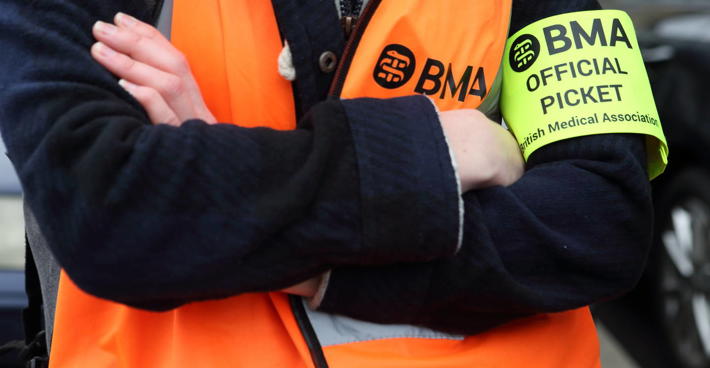
Were she brighter, she might have noticed that the BMA junior doctors’ entire campaign has very visibly centred on ‘pay restoration’.
You want more low-grade fun?
Try the classic bathos of disgraced former shadow health secretary and Tory MP Liam Fox weighing in with his assertion that “as a former NHS doctor, it makes me sad and angry to see doctors involved in action which I believe to be unethical and unforgivable, given the harm being done to patients and the NHS itself”.
As a former NHS doctor, it makes me sad and angry to see doctors involved in action which I believe to be unethical and unforgivable, given the harm being done to patients and the NHS itself
— Sir Liam Fox MP (@LiamFox) January 3, 2024
There is scant reflection here on which political party has been running the country for the last thirteen-and-a-half years. Dr Fox proves yet again that politics’ loss was the NHS’s gain.
Consultant ballot
Consultants are currently voting on the pay offer their leaders and the Government negotiated. We get the results towards the end of this month.
2/ You'll notice when ministers are in the media, they often talk about how hard "your viewers/listeners" have been hit by inflation. But what we need to do is separate fact from fiction (aka LIES), and it was 👇chart from excellent @jburnmurdoch @FT that really showed this well pic.twitter.com/w72z8xjJ4N
— Dr Tony Goldstone (@goldstone_tony) January 5, 2024
The BMA’s Tony Goldstone updated his pay analysis with the latest data up to September 2023, so since the pay awards: it includes DDRB backpay for half of the 2023-24 financial year.
30/ Our NHS is in a DIRE state. None of this is due to striking NHS workers, or (just) covid, but due to political choices @10DowningStreet
— Dr Tony Goldstone (@goldstone_tony) January 5, 2024
RT if you want this (or the next) government to make the choices to fix this mess now & properly #payrestoration #fixDDRB pic.twitter.com/Wz2eU3ryn8
This data is really quite shocking, and Goldstone is both influential and trusted among consultants.
When you put together the attitudes on display from the Government and its media stenographers towards the striking junior doctors alongside this updated picture (and the rate card earnings from covering the pre- and post-Christmas junior doctors’ strikes), I become increasingly confident of my mid-December prediction that consultants will vote to reject the deal.
Schrödinger’s stats

Good old NHS England.
Everybody’s favourite wholly-owned subsidiary of the Department For Health But Social Care has issued Schrödinger’s stats: simultaneously too unreliable to publish properly, and telling a convenient success story.
Covering the period between October and mid-December, Schrödinger’s stats are badged as ‘supplementary information’ about longer-waiting RTT patients. They show that NHS trusts reduced the number of 65-week breaches by around 20 per cent, and cut the overall elective waiting list.
This ‘supplementary information’ came with a warning of possible “significant issues regarding the quality and completeness”. You don’t say. HSJ’s James Illman writes that “the figures suggest the number of 65-week waiters fell from around 114,000 on 8 October to around 93,000 by 17 December ... the last official “referral to treatment” figures published last month reported there were around 107,000 65-week breaches in October”.
We get to the real reason for this atypical publication when James adds that “NHSE said the provisional figures, which are far more recent than the official statistics (which have a two-month lag) illustrated the progress trusts had made before the latest wave of strikes”.
This strike-blaming, while unsurprising, is ironic given the extant failures to hit either the two-year or 18-month targets from the electoral recovery plan.
Sunak: assumptions and pledges

PM Sunak told the BBC1 Laura Kuenssberg Show that “towards the end of last year we had a period without any strikes in the NHS, and what did we see, we saw the waiting lists fall tens of thousands, by 65,000 over the period of October.
”Waiting lists started to fall when you had a period without industrial action, so that actually gives me the confidence to know that once we can resolve the outstanding industrial action... that we will be able to see waiting lists fall because of the extra investment and resources we have put in the NHS.'
“The Government has now reached resolution with every other part of the NHS, nurses, midwives, paramedics, consultant doctors, speciality doctors most recently”.
There is a slight problem with the PM’s statement, which is that it is pretty much all bullshit.
Consultant and SAS doctors are both voting on their pay offers (which the PM has presented here as a done deal). These are not stupid people, and many of them do in real life watch politics programmes and political media coverage: this mis-statement of affairs is unlikely to increase support for those deals.
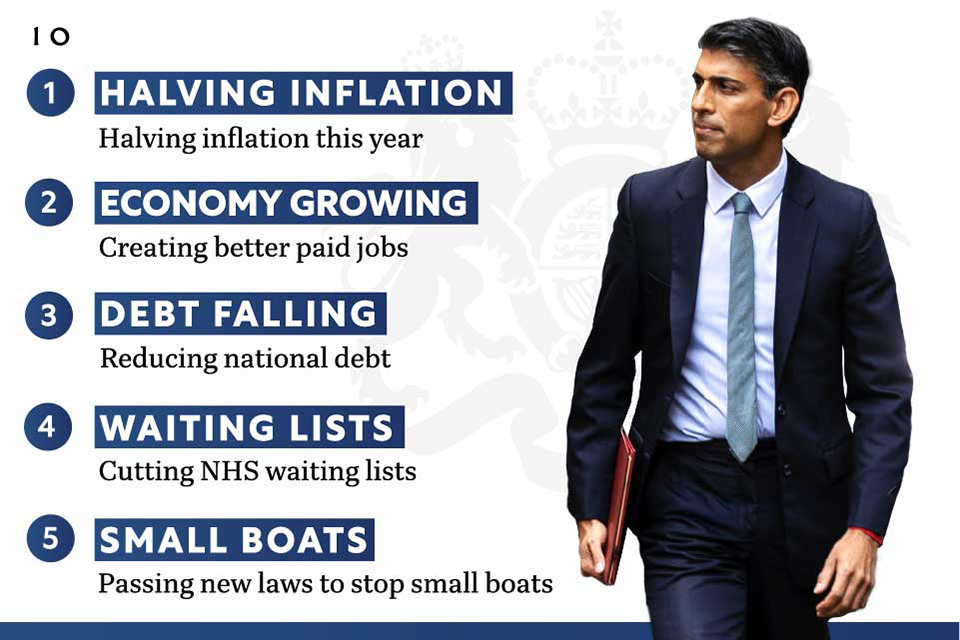
More importantly, the PM’s pledge in January 2023 for the upcoming year promised that NHS waiting lists would be falling, when the latest data shows that they are now half a million bigger than in December 2022.
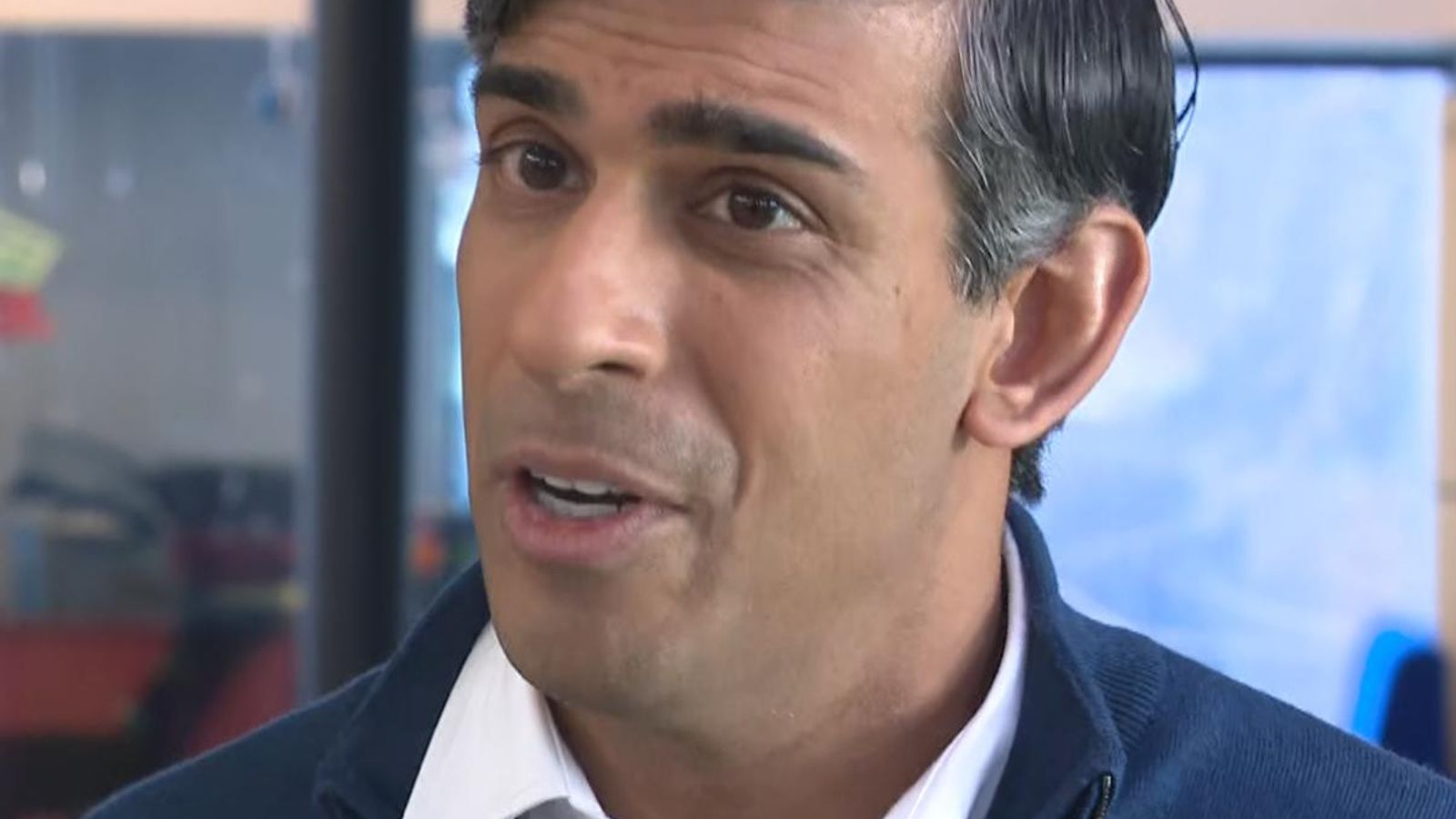
Whether this is displacement activity or something else, it throws into sharp relief the PM’s comments that his “working assumption” is that he will call the next General Election in the second half of 2024.
It’s going to be a long ten months, then.
‘And then, a miracle happens!’
Even given that 2024 is a year in which a General Election must be called, we have hit the ‘and then, a miracle happens!’ stage of health policy remarkably early.

Health Service Journal has been told that NHSE’s delayed Planning Guidance for 2024-25 will raise the national target for A&E four-hour performance from the currently-missed 76% to 80%.
By the tapping of an NHSE keyboard, the NHS will see a 4% improvement in A&E performance, it seems.
HSJ’s Matt Discombe points out that “the beginning of this financial year was the closest the NHS nationally has come to meeting it (the four-hour A&E target), delivering 74.6 per cent in April 2023.
“The latest data, for November, shows 69.7 per cent of all emergency patients were admitted, transferred or discharged within four hours in November – dropping to 55.4 per cent for patients at major A&E departments only”.
Palantir try to smear
I consistently declare my interest in anything I write about or adjacent to Federated Data Platform contract winners Palantir: I have been (and pro tem remain) paid for my work as a member of their health advisory panel.
Palantir were made well aware of my being an outspoken and independent journalist when this arrangement was agreed.

They will therefore be unsurprised that I am covering their attempt via third party proxy to procure the smearing of the Good Law Project by social media influencers.
It is a remarkable thing to try to do.
A performance-led influencer marketing agency (no, me neither) called Disrupt was hired by longstanding Conservative And Unionist Party favourite PR agency Topham Guerin to approach digital health influencers to ask what they would charge to publish tweets with content written on behalf of (but not acknowledging) Palantir, which would detail the alleged misrepresentations of the Good Law Project: a prominent critic of Palantir and of the FDP contract.
The slogan on Disrupt’s website is “making brands famous”.
Well, mission accomplished.
Because Disrupt approached EveryGrifter, sorry, EveryDoctor, who are quite really well-known for working with Good Law Project on the GLP’s successful case against the Government’s pandemic VIP fast-lane.
EveryGrifter, sorry, EveryDoctor also co-signed the GLP’s ‘No Palantir In Our NHS’ campaign.
So, it seems that Disrupt’s research capacity did not extend to putting ‘EveryDoctor’ and ‘Good Law Project’ into Google.
Ooops.

The Good Law Project’s write-up of these matters can be found here and here: the latter of which notes that Palantir’s covert efforts breach their contract to have NHS England’s permission before making any marketing effort.
Olivia Solon of Bloomberg follows up the GLP story here, spotting that a heavily redacted version of the Federated Data Platform contract let by NHS England was published on the last working day before Christmas.
Palantir is prohibited from making any press announcements about the contract or referencing the NHS in any marketing campaign without prior written consent. (This is, believe it or not, a marketing effort.)
Ooops.
Responding to Bloomberg, Palantir claimed that its campaign was an “exploratory project”, and as such, it did not need to consult NHSE. Palantir’s Executive Vice-President for UK and Europe Louis Moseley said, “we decided not to pursue the project — as such, the campaign was not discussed with NHS England”.
Ooops.
Still, who could have imagined that people were going to say bad things about Palantir, or be at all suspicious of its brand?
And this will definitely help Palantir a lot. #MakingBrandsFamous
Everybody’s New Favourite Noble BaronessWatch
A statement from my husband Doug Barrowman on PPE Medpro and the truth about what has happened to us. ⬇️ pic.twitter.com/CwJOnS7hPL
— Lady Michelle Mone (@MichelleMone) January 1, 2024
She’s adorable! Everybody’s New Favourite Noble Baroness’ Kiss (formerly Twitter) account has long been a thing of beauty, but now it is part of her and her husband’s media fightback.
Alas for Tory peer and proven liar ENFNB Mone and her proven liar husband, one of the very few improvements in Kiss since EM’s ownership has been the addition of ‘community notes’, where users can add vital context to posts.
To her Kiss (formerly tweet) of her husband’s ‘statement’, the following community note has been added: “in 2020, when asked about PPE Medpro, lawyers for Mone and Barrowman insisted the couple were not involved and had "no role or function in PPE Medpro, nor in the process by which contracts were awarded to PPE Medpro".
It couldn’t happen to a nicer couple.
— Lady Michelle Mone (@MichelleMone) November 24, 2022
It gets better.

The Times reports that “Tory peer Michelle Mone and her husband Doug Barrowman are selling off luxury houses, a private jet and their superyacht”.
The poor dears.
Recommended and required reading
Nicely upbeat new year HSJ ‘Mythbuster’ column from Steve Black.
FT report of more big healthcare corporates in the USA filing for Chapter 11 bankruptcy.
A new paper in Nature recounts how in vivo clinical trials on mice have shown that zosurabalpin is able to eliminate a strain of ‘superbug’ (carbapenem-resistant Acinetobacter baumannii (CRAB)) bacteria that current antibiotics do not affect, The Times reports.
The new IPPR report ‘Great Government: Public Service Reform In The 2020s’ basically says it’ll take a decade, and the old New Public Management box of tricks is a busted flush: there is not much on how it will be achieved.






